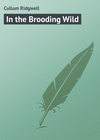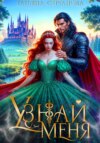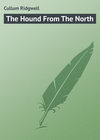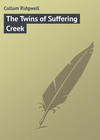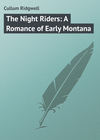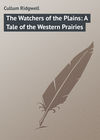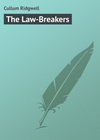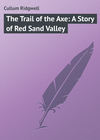Kitobni o'qish: «In the Brooding Wild»
CHAPTER I.
ON THE MOUNTAINSIDE
To the spirit which broods over the stupendous solitudes of the northern Rockies, the soul of man, with all its complex impulses, is but so much plastic material which it shapes to its own inscrutable ends. For the man whose lot is cast in the heart of these wilds, the drama of life usually moves with a tremendous simplicity toward the sudden and sombre tragedy of the last act. The titanic world in which he lives closes in upon him and makes him its own. For him, among the ancient watch-towers of the earth, the innumerable interests and activities of swarming cities, the restless tides and currents of an eager civilization, take on the remoteness of a dream. The peace or war of nations is less to him than the battles of Wing and Fur. His interests are all in that world over which he seeks to rule by the law of trap and gun, and in the war of defence which he wages against the aggression of the elements. He returns insensibly to the type of the primitive man, strong, patient, and enduring.
High up on the mountainside, overlooking a valley so deep and wide as to daze the brain of the gazing human, stands a squat building. It seems to have been crushed into the slope by the driving force of the vicious mountain storms to which it is open on three sides. There is no shelter for it. It stands out bravely to sunshine and storm alike with the contemptuous indifference of familiarity. It is a dugout, and, as its name implies, is built half in the ground. Its solitary door and single parchment-covered window overlook the valley, and the white path in front where the snow is packed hard by the tramp of dogs and men, and the runners of the dog-sled. Below the slope bears away to the woodlands. Above the hut the overshadowing mountain rises to dazzling heights; and a further, but thin, belt of primeval forest extends up, up, until the eternal snows are reached and the air will no longer support life. Even to the hardy hunters, whose home this is, those upper forests are sealed chapters in Nature’s story.
Below the dugout, and beyond the valley, lie countless lesser hills, set so closely that their divisions are lost in one smooth, dark expanse of forest. Blackened rifts are visible here and there, but they have little meaning, and only help to materialize what would otherwise wear an utterly ghostly appearance. The valley in front is so vast that its contemplation from the hillside sends a shudder of fear through the heart. It is dark, dreadfully dark and gloomy, although the great stretch of pine forest, which reaches to its uttermost confines, bears upon its drooping branches the white coat of winter.
The valley is split by a river, now frozen to its bed. But, from the hut door, the rift which marks its course in the dark carpet cannot be seen.
In the awesome view no life is revealed. The forests shadow the earth and every living thing upon it, and where the forest is not there lies the snow to the depth of many feet. It is a scene of solemn grandeur, over which broods silence and illimitable space.
Out of the deathly stillness comes a long-drawn sigh. It echoes down the hillside like the weary expression of patient suffering from some poor creature imprisoned where ancient glacier and everlasting snows hold place. It passes over the low-pitched roof of the dugout, it plays about the angles and under the wide reaching eaves. It sets the door creaking with a sound that startles the occupants. It passes on and forces its way through the dense, complaining forest trees. The opposition it receives intensifies its plaint, and it rushes angrily through the branches. Then, for awhile, all is still again. But the coming of that breath from the mountain top has made a difference in the outlook. Something strange has happened. One looks about and cannot tell what it is. It may be that the air is colder; it may be that the daylight has changed its tone; it may be that the sunlit scene is changed as the air fills with sparkling, diamond frost particles. Something has happened.
Suddenly a dismal howl splits the air, and its echoes intensify the gloom. Another howl succeeds it, and then the weird cry is taken up by other voices.
And ere the echoes die out another breath comes down from the hilltop, a breath less patient; angry with a biting fierceness which speaks of patience exhausted and a spirit of retaliation.
It catches up the loose snow as it comes and hurls it defiantly at every obstruction with the viciousness of an exasperated woman. Now it shakes the dugout, and, as it passes on, shrieks invective at the world over which it rushes, and everything it touches feels the bitter lash of the whipping snow it bears upon its bosom. Again come the strange howls of the animal world, but they sound more distant and the echoes are muffled, for those who cry out have sought the woodland shelter, where the mountain breath exhausts itself against the countless legions of the pines.
Ere the shriek has died out, another blast comes, down the mountainside, and up rises the fine-powdered snow like a thin fog. From the valley a rush of wind comes up to meet it, and the two battle for supremacy. While the conflict rages fresh clouds of snow rise in other directions and rush to the scene of action. Encountering each other on the way they struggle together, each intolerant of interference, until the shrieking is heard on every hand, and the snow fog thickens, and the dull sun above grows duller, and the lurid “sun dogs” look like evil coals of fire burning in the sky.
Now, from every direction, the wind tears along in a mad fury. The forest tops sway as with the roll of some mighty sea swept by the sudden blast of a tornado. In the rage of the storm the woodland giants creak out their impotent protests. The wind battles and tears at everything, there is no cessation in its onslaught.
And as the fight waxes the fog rises and a grey darkness settles over the valley. The forest is hidden, the hills are gone, the sun is obscured, and a fierce desolation reigns. Darker and darker it becomes as the blizzard gains force. And the cries of the forest beasts add to the chaos and din of the mountain storm.
The driving cold penetrates, with the bite of invisible arrows, to the interior of the dugout. The two men who sit within pile up the fuel in the box stove which alone makes life possible for them in such weather. The roof groans and bends beneath the blast. Under the rattling door a thin carpet of snow has edged its way in, while through the crack above it a steady rain of moisture falls as the snow encounters the rising heat of the stifling atmosphere.
“I knew it ’ud come, Nick,” observed one of the men, as he shut the stove, after carefully packing several cord-wood sticks within its insatiable maw.
He was of medium height but of large muscle. His appearance was that of a man in the prime of life. His hair, above a face tanned and lined by exposure to the weather, was long and grey, as was the beard which curled about his chin. He was clad in a shirt of rough-tanned buckskin and trousers of thick moleskin. His feet were shod with moccasins which were brilliantly beaded. Similar bead-work adorned the front of the weather-proof shirt.
His companion was a slightly younger and somewhat larger man. The resemblance he bore to his comrade indicated the relationship between them. They were brothers.
Ralph and Nicol Westley were born and bred in that dugout. Their father and mother were long since dead, dying in the harness of the toil they had both loved, and which they bequeathed to their children. These two men had never seen the prairie. They had never left their mountain fastnesses. They had never even gone south to where the railway bores its way through the Wild.
They had been born to the life of the trapper and knew no other. They lived and enjoyed their lives, for they were creatures of Nature who understood and listened when she spoke. They had no other education. The men lived together harmoniously, practically independent of all other human companionship.
At long intervals, when pelts had accumulated and supplies had run low, they visited the cabin of an obscure trader. Otherwise they were cut off from the world and rejoiced in their isolation.
“Yes, we’ve had the warnin’ this week past,” rejoined Nick solemnly, as he affectionately polished the butt of his rifle with a rag greased with bear’s fat. “Them ’patch’ winds at sunrise an’ sunset ain’t sent fer nothin’. I ’lows Hell’s hard on the heels o’ this breeze. When the wind quits there’ll be snow, an’ snow means us bein’ banked in. Say, she’s boomin’. Hark to her. You can hear her tearin’ herself loose from som’eres up on the hilltops.”
Nick looked round the hut as though expecting to see the storm break through the walls of their shelter. A heavy storm always affected the superstitious side of these men’s natures. A blizzard to them was as the Evil Spirit of the mountains. They always possessed the feeling, somewhere deep down in their hearts, that the attack of a storm was directed against them. And the feeling was a mute acknowledgment that they were interlopers in Nature’s most secret haunts.
Ralph had planted himself upon an upturned bucket, and sat with his hands thrust out towards the stove. He was smoking, and his eyes were directed in a pensive survey at a place where the black iron of the stove was steadily reddening.
Presently he looked up.
“Ha’ ye fed the dogs, lad?” he asked.
“Ay.”
The two relapsed into silence. The creaking of the hut was like the protest of a wooden ship riding a heavy storm at sea. The men shifted their positions with every fresh burst which struck their home; it was as though they personally felt each shock, and their bones ached with the strain of battle. The smoke curled up slowly from Ralph’s pipe and a thin cloud hovered just beneath the roof. The red patch on the stove widened and communicated itself to the stovepipe. Presently the trapper leaned forward, and, closing the damper, raked away the ashes with a chip of wood.
Nick looked up and laid his gun aside, and, rising, stepped over to the stove.
“Makes ye feel good to hear the fire roarin’ when it’s stormin’ bad. Ther’ ain’t no tellin’ when this’ll let up.” He jerked his head backward to imply the storm.
“It’s sharp. Mighty sharp,” replied his brother. “Say–”
He broke off and bent his head in an attitude of keen attention. He held his pipe poised in his right hand, whilst his eyes focused themselves on a side of bacon which hung upon the wall.
Nick had turned towards the door. His attitude was intent also; he, too, was listening acutely.
The howling elements continued to beat furiously upon the house and the din was appalling, but these two men, keen-eared, trained to the life of their mountains, had heard a sound which was not the storm, nor of the forest creatures doling their woful cries beneath the shelter of the woods.
Slowly Ralph’s eyes moved from the bacon and passed over the smoke stained wooden wall of the hut. Nor did they pause again until they looked into the eyes of his brother. Here they fixed themselves and the working brains of the two men seemed to communicate one with the other. Neither of them was likely to be mistaken. To hear a sound in those wilds was to recognize it unerringly.
“A cry,” said Nick.
“Some ’un out in the storm,” replied Ralph.
“A neche.”
Ralph shook his head.
“A neche would ’a’ know’d this was comin’. He’d ’a’ made camp. ’Tain’t a neche. Hark!”
The beat of the storm seemed to drown all other sounds, and yet those two men listened. It is certain that what they heard would have been lost to most ears.
Ralph rose deliberately. There was no haste, nor was there any hesitation. His intention was written on his face.
“The lifeline,” he said briefly.
Out into the awful storm the two men plunged a few moments later. There was no thought of their own comfort in their minds. They had heard a cry–the cry of a human being, and they were prepared to lend such aid as lay in their power. They did not pause to wonder at a voice other than their own in those regions. Some one was caught in the storm, and they knew that such a disaster meant certain death to the poor wretch if they did not go to the rescue. The terror of the blizzard was expressed in the significant words Ralph had uttered. Even these hardy men of the wild dared not venture beyond their door without the lifeline which was always kept handy.
With their furs covering every part of them but their eyes and noses they plunged into the fog of blinding snow. They could see nothing around them–they could not even see their own feet. Each gripped a long pole, and used his other hand to grasp the line.
They moved down the beaten path with certain step. Three yards from the dugout and the house was obscured. The wind buffeted them from every direction, and they were forced to bend their heads in order to keep their eyes open.
The whole attack of the wind now seemed to centre round those two struggling human creatures. It is the way of the blizzard. It blows apparently from every direction, and each obstacle in its chaotic path becomes the special object of its onslaught.
A forceful gust, too sudden to withstand, would drive them, blind, groping, from their path; and a moment later they would be hurled like shuttlecocks in the opposite direction. They staggered under the burden of the storm, and groped for the solid foothold of the track with their poles; and so they slowly gained their way.
Their strenuous life had rendered them uncomplaining, and they laboured in silence. No emergency but they were ready to meet with a promptness that was almost automatic. A slip upon the declining path and the fall was checked by the aid of the poles which both men used as skilfully as any guide upon the Alps. These contests with the elements were as much a part of their lives as were their battles with the animal world.
After awhile Ralph halted; he thrust his pole deep into the snow and held his position by its aid. Then, throwing up his head, as might any wolf, he opened his throat and uttered a prolonged cry. It rose high above the storm in a manner which only the cry of a mountain or forest bred man can. It rushed forth borne unwillingly upon the shrieking wind, and its sound almost instantly died out of the ears of the sender. But the men knew it was travelling. Nick followed his brother’s example, and then Ralph gave out the mountain call again.
Then they waited, listening. A sound, faint and far off, came in answer to their cries. It was the human cry they had heard before.
Ralph moved forward with Nick hard upon his heels. The line “paid out,” and the points of the poles sought the hard earth beneath the snow. They gained their way in spite of the storm, foot by foot, yard by yard. And, at short intervals, they paused and sent their cries hurtling upon the vicious wind. And to every cry came an answer, and every answer sounded nearer.
They were on the only open track in the valley, and both men knew that whoever was out in that storm must be somewhere upon it. Therefore they kept on.
“The line’s gettin’ heavy,” said Nick presently.
“It’s only a little further,” replied Ralph.
“By the weight o’ the line, I reckon ther’ ain’t more’n fifty feet more.”
“Maybe it’ll be ’nough.”
And Ralph was right.
Ten yards further on they almost fell over a dark mass lying in the snow. It was a huddled heap, as of a creature striving to shut out the attack of the storm. It was the attitude of one whose heart quails with dread. It was the attitude of one, who, in possession of all his faculties and strength, lies down to die. Rank cowardice was in that fur-clad figure, and the cries for help were as the weeping of a fear-filled soul.
Ralph was down upon his knees in a moment, and all that the still figure conveyed was at once apparent to him. His hand fell heavily upon the man’s shoulder, and he turned him over to look at his face.
The victim of the storm groaned; as yet he was unable to realize that help was at hand. Then, after several rough shakes, his head emerged from the folds of an enormous storm-collar.
As he looked up at the faces bending over him the two trappers uttered exclamations.
“It’s the trader!” said Ralph.
“Victor Gagnon!” exclaimed Nick.
CHAPTER II.
WHICH TELLS OF THE WHITE SQUAW
The stormy day was followed by an equally stormy night. Inside the dugout it was possible, in a measure, to forget the terrors of the blizzard raging outside. The glowing stove threw out its comforting warmth, and even the rank yellow light of the small oil lamp, which was suspended from one of the rafters, gave a cheering suggestion of comfort to the rough interior. Besides, there were within food and shelter and human association, and the mind of man is easily soothed into a feeling of security by such surroundings.
The trappers had brought the rescued trader to the shelter of their humble abode; they had refreshed him with warmth and good food; they had given him the comfort of a share of their blankets, the use of their tobacco, all the hospitality they knew how to bestow.
The three men were ranged round the room in various attitudes of repose. All were smoking heavily. On the top of the stove stood a tin billy full to the brim of steaming coffee, the scent of which, blending with the reek of strong tobacco, came soothingly to their nostrils.
Victor Gagnon was lying full length upon a pile of outspread blankets. His face was turned towards the stove, and his head was supported upon one hand. He looked none the worse for his adventure in the storm. He was a small, dark man of the superior French half-breed class. He had a narrow, ferret face which was quite good looking in a mean small way. He was clean shaven, and wore his straight black hair rather long. His clothes, now he had discarded his furs, showed to be of orthodox type, and quite unlike those of his hosts. He was a trader who kept a store away to the northeast of the dugout. He worked in connection with one of the big fur companies of the East, as an agent for the wholesale house dealing directly with trappers and Indians.
This was the man with whom the Westleys traded, and they were truly glad that chance had put it in their power to befriend him. Their associations with him, although chiefly of a business nature, were decidedly friendly.
Now they were listening to his slow, quiet, thoughtful talk. He was a man who liked talking, but he always contrived that his audience should be those who gave information. These two backwoodsmen, simple as the virgin forests to which they belonged, were not keen enough to observe this. Victor Gagnon understood such men well. His life had been made up of dealings with the mountain world and those who peopled it.
Nick, large and picturesque, sat tailor-fashion on his blankets, facing the glowing stove with the unblinking, thoughtful stare of a large dog. Ralph was less luxurious. He was propped upon his upturned bucket, near enough to the fire to dispense the coffee without rising from his seat.
“Yup. It’s a long trail for a man to make travellin’ light an’ on his lone,” Victor was saying, while his black eyes flashed swiftly upon his companions. “It’s not a summer picnic, I guess. Maybe you’re wonderin’ what I come for.”
He ceased speaking as a heavy blast shook the roof, and set the lamp swinging dangerously.
“We’re good an’ pleased to see you–” began Ralph, in his deliberate way; but Victor broke in upon him at once.
“O’ course you are. It’s like you an’ Nick there to feel that way. But human natur’s human natur’, an’ maybe som’eres you are jest wonderin’ what brought me along. Anyway, I come with a red-hot purpose. Gee! but it’s blowin’. I ain’t like to forget this storm.” Gagnon shuddered as he thought of his narrow escape.
“Say,” he went on, with an effort at playfulness. “You two boys are pretty deep–pretty deep.” He repeated himself reflectively. “An’ you seem so easy and free, too. I do allow I’d never ’a’ thought it. Ha, ha!”
He turned a smiling face upon his two friends and looked quizzically from one to the other. His look was open, but behind it shone something else. There was a hungriness in his sharp, black eyes which would have been observed by any one other than these two backwoodsmen.
“You allus was a bit fancy in your way o’ speakin’, Victor,” observed Nick, responding to the man’s grin. “Hit the main trail, man. We ain’t good at guessin’.”
Ralph had looked steadily at the trader while he was speaking; now he turned slowly and poured out three pannikins of coffee. During the operation he turned his visitor’s words over in his mind and something of their meaning came to him. He passed a tin to each of the others and sipped meditatively from his own, while his eyes became fixed upon the face of the half-breed.
“Ther’ was some fine pelts in that last parcel o’ furs you brought along,” continued Victor. “Three black foxes. But your skins is always the best I get.”
Ralph nodded over his coffee, whilst he added his other hand to the support of the tin. Nick watched his brother a little anxiously. He, too, felt uneasy.
“It’s cur’us that you git more o’ them black pelts around here than anybody else higher up north. You’re a sight better hunters than any durned neche on the Peace River. An’ them hides is worth more’n five times their weight in gold. You’re makin’ a pile o’ bills. Say, you keep them black pelts snug away wi’ other stuff o’ value.”
Gagnon paused and took a deep draught at his coffee.
“Say,” he went on, with a knowing smile. “I guess them black foxes lived in a gold mine–”
He broke off and watched the effect of his words. The others kept silence, only their eyes betrayed them. The smoke curled slowly up from their pipes and hung in a cloud about the creaking roof. The fire burned fiercely in the stove, and with every rush of wind outside there came a corresponding roar of flame up the stovepipe.
“Maybe you take my meanin’,” said the Breed, assured that his words had struck home. “Them black furs was chock full o’ grit–an’ that grit was gold-dust. Guess that dust didn’t grow in them furs; an’ I ’lows foxes don’t fancy a bed o’ such stuff. Say, boys, you’ve struck gold in this layout o’ yours. That’s what’s brought me out in this all-fired storm.”
The two brothers exchanged rapid glances and then Ralph spoke for them both.
“You’re smart, Victor. That’s so. We’ve been workin’ a patch o’ pay-dirt for nigh on to twelve month. But it’s worked out; clear out to the bedrock. It wa’n’t jest a great find, though I ’lows, while it lasted, we took a tidy wage out o’ it–”
“An’ what might you call a ‘tidy wage’?” asked the Breed, in a tone of disappointment. He knew these men so well that he did not doubt their statement; but he was loth to relinquish his dream. He had come there to make an arrangement with them. If they had a gold working he considered that, provided he could be of use to them, there would be ample room for him in it. This had been the object of his hazardous journey. And now he was told that it had worked out. He loved gold, and the news came as a great blow to him.
He watched Ralph keenly while he awaited his reply, sitting up in his eagerness.
“Seventy-fi’ dollars a day,” Ralph spoke without enthusiasm.
Victor’s eyes sparkled.
“Each?” he asked.
“No, on shares.”
There was another long silence while the voice of the storm was loud without. Victor Gagnon was thinking hard, but his face was calm, his expression almost indifferent. More coffee was drunk, and the smoke continued to rise.
“I ’lows you should know if it’s worked out, sure.”
The sharp eyes seemed to go through Ralph.
“Dead sure. We ain’t drawn a cent’s worth o’ colour out o’ it fer nine months solid.”
“’Tain’t worth prospectin’ fer the reef?”
“Can’t say. I ain’t much when it comes to prospectin’ gold. I knows the colour when I sees it.”
Nick joined in the conversation at this point.
“Guess you’d a notion you fancied bein’ in it,” he said, smiling over at the Breed.
Victor laughed a little harshly.
“That’s jest what.”
The two brothers nodded. This they had understood.
“I’d have found all the plant fer big work,” went on the trader eagerly. “I’d have found the cash to do everything. I’d have found the labour. An’ us three ’ud have made a great syndicate. We’d ’a’ run it dead secret. Wi’ me in it we could ’a’ sent our gold down to the bank by the dogs, an’, bein’ as my shack’s so far from here, no one ’ud ever ’a’ found whar the yeller come from. It ’ud ’a’ been a real fine game–a jo-dandy game. An’ it’s worked clear out?” he asked again, as though to make certain that he had heard aright.
“Bottomed right down to the bedrock. Maybe ye’d like to see fer yourself?”
“Guess I ken take your word, boys; ye ain’t the sort to lie to a pal. I’m real sorry.” He paused and shifted his position. Then he went on with a slightly cunning look. “I ’lows you’re like to take a run down to Edmonton one o’ these days. A feller mostly likes to make things hum when he’s got a good wad.” Gagnon’s tone was purely conversational. But his object must have been plain to any one else. He was bitterly resentful at the working out of the placer mine, and his anger always sent his thoughts into crooked channels. His nature was a curious one; he was honest enough, although avaricious, while his own ends were served. It was different when he was balked.
“We don’t notion a city any,” said Nick, simply.
“Things is confusin’ to judge by the yarns folks tell,” added Ralph, with a shake of his shaggy head.
“Them fellers as comes up to your shack, Victor, mostly talks o’ drink, an’ shootin’, an’–an’ women,” Nick went on. “Guess the hills’ll do us. Maybe when we’ve done wi’ graft an’ feel that it ’ud be good to laze, likely we’ll go down an’ buy a homestead on the prairie. Maybe, I sez.”
Nick spoke dubiously, like a man who does not convince himself.
“Hah, that’s ’cause you’ve never been to a city,” said the Breed sharply.
“Jest so,” observed Ralph quietly, between the puffs at his pipe.
Gagnon laughed silently. His eyes were very bright and he looked from one brother to the other with appreciation. An idea had occurred to him and he was mentally probing the possibilities of carrying it out. What he saw pleased him, for he continued to smile.
“Well, well, maybe you’re right,” he said indulgently. Then silence fell.
Each man was rapt in his own thoughts, and talk without a definite object was foreign to at least two of the three. The brothers were waiting in their stolid Indian fashion for sleep to come. The trader was thinking hard behind his lowered eyelids, which were almost hidden by the thick smoke which rose from his pipe.
The fire burned down and was replenished. Ralph rose and gathered the pannikins and threw them into a biscuit-box. Then he laid out his blankets while Nick went over and bolted the door. Still the trader did not look up. When the two men had settled themselves comfortably in their blankets the other at last put his pipe away.
“No,” he said, as he too negotiated his blankets, “guess we want good sound men in these hills, anyway. I reckon you’ve no call to get visitin’ the prairie, boys; you’re the finest hunters I’ve ever known. D’ye know the name your shack here goes by among the down-landers? They call it the ‘Westley Injun Reserve.’”
“White Injuns,” said Nick, with a grin followed by a yawn.
“That’s what,” observed Victor, curling himself up in his blankets. “I’ve frequent heard tell of the White Squaw, but White Injuns sounds like as it wa’n’t jest possible. Howsum, they call you real white buck neches, an’ I ’lows ther’ ain’t no redskin in the world to stan’ beside you on the trail o’ a fur.”
The two men laughed at their friend’s rough tribute to their attainments. Ralph was the quieter of the two, but his appreciation was none the less. He was simple-hearted, but he knew his own worth when dealing with furs. Nick laughed loudly. It tickled him to be considered a White Indian at the calling which was his, for his whole pride was in his work.
Nick was not without a romantic side to his nature. The life of the mountains had imbued him with a half-savage superstition which revelled in the uncanny lore of such places. This was not the first time he had heard of a White Squaw, and, although he did not believe such a phenomenon possible, it appealed seductively to his love of the marvellous. Victor had turned over to sleep, but Nick was very wide awake and interested. He could not let such an opportunity slip. Victor was good at a yarn. And, besides, Victor knew more of the mountain-lore than any one else. So he roused the Breed again.
“You was sayin’ about a White Squaw, Victor,” he said, in a shamefaced manner. His bronzed cheeks were deeply flushed and he glanced over at his brother to see if he were laughing at him. Ralph was lying full length upon his blankets and his eyes were closed, so he went on. “Guess I’ve heerd tell of a White Squaw. Say, ain’t it that they reckon as she ain’t jest a human crittur?”
Victor opened his eyes and rolled over on his back. If there was one weakness he had it was the native half-breed love of romancing. He was ever ready to yarn. He revelled in it when he had a good audience. Nick was the very man for him, simple, honest, superstitious. So he sat up and answered readily enough.
“That’s jest how, pard. An’ it ain’t a yarn neither. It’s gospel truth. I know.”
“Hah!” ejaculated Nick, while a strange feeling passed down his spine. Ralph’s eyes had slowly opened, but the others did not notice him.
“I’ve seen her!” went on the trader emphatically.
“You’ve seen her!” said Nick, in an awed whisper.
An extra loud burst of the storming wind held the men silent a moment, then, as it died away, Victor went on.
“Yes, I see her with my own two eyes, an’ I ain’t like to ferget it neither. Say, ye’ve seen them Bible ’lustrations in my shanty? Them pictur’s o’ lovesome critturs wi’ feathery wings an’ sech?”
